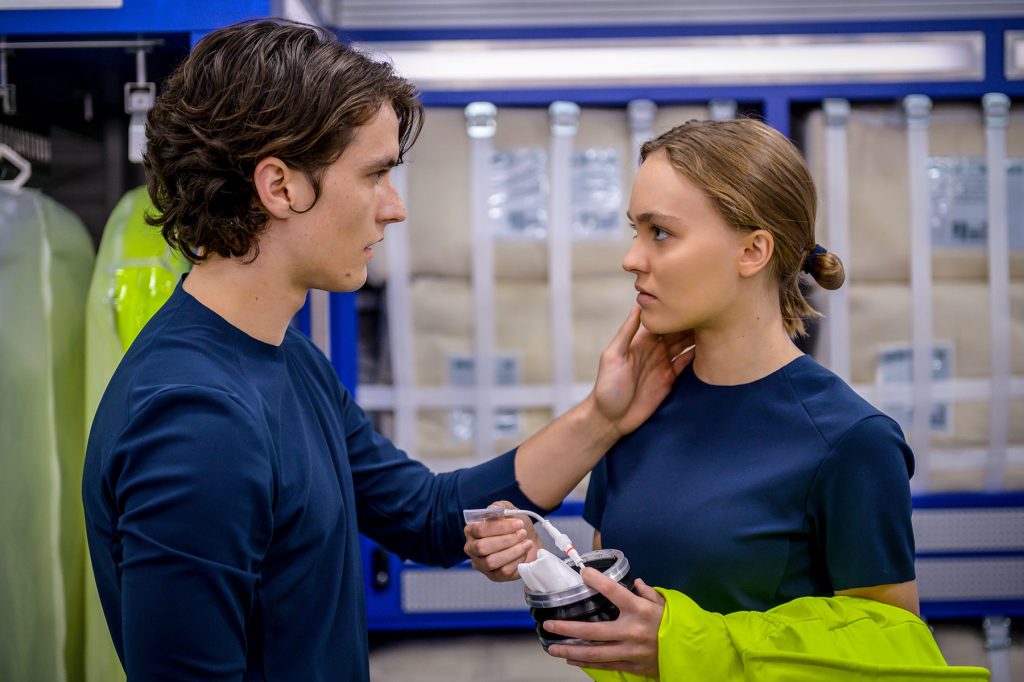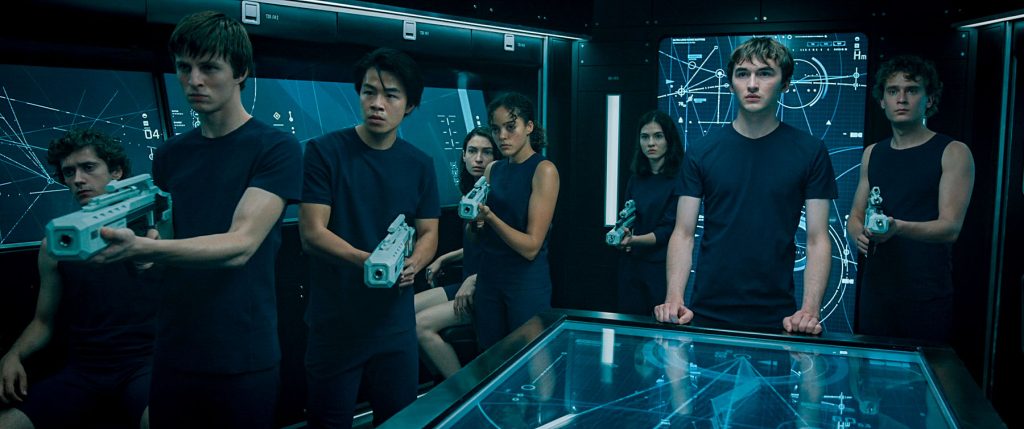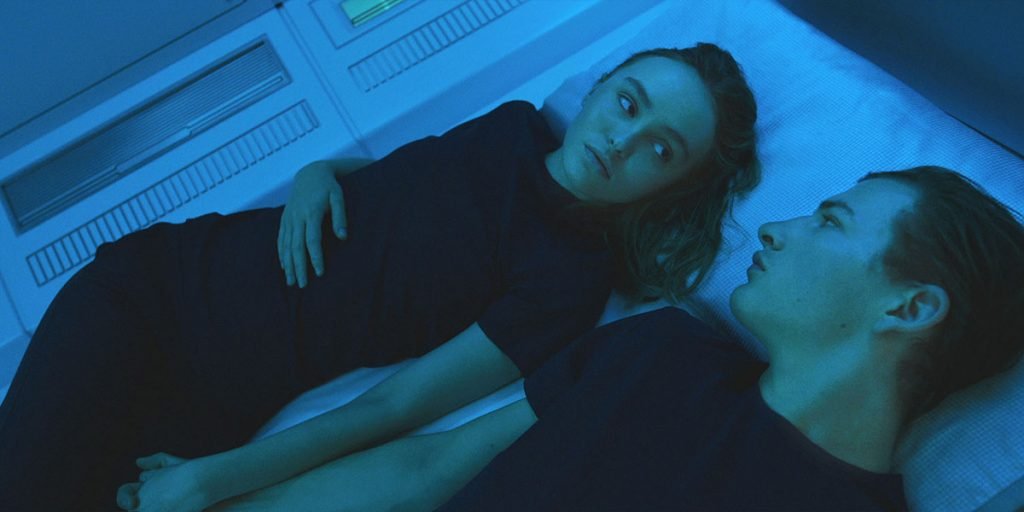Voyagers ends where it should have begun, taking one too many detours to tell the compelling story of the first generation of lab-bred humans on a scouting mission to space.
In Voyagers, writer-director Neil Burger (Limitless, Divergent) imagines a future where the Earth is growing hotter by the minute, facing droughts and disease, and humanity is at serious risk of extinction. The only way to ensure the survival of our species is to look for answers in space, and those answers come in the not-so-distant year 2063, with the discovery of a planet that has enough water and oxygen to be able to support human life. Led by the empathetic Richard (Colin Farrell, of The Banshees of Inisherin), a team of scientists starts planning the perfect mission, and they soon realize that the voyage will have to span through more than one generation, as it will take a lifetime to get there.
Over the course of 86 years, the crew will therefore have to reproduce on the ship, and their grandchildren will eventually be able to reach the planet and colonize it, ensuring humanity’s survival. But spending one’s lifetime on a ship is no easy feat, and many are the questions going through those scientists’ minds. How will they find thirty young crew members that are qualified enough to be able to cope with the stress of prolonged confinement, and ready to cope with the awareness that they will never return to Earth?
After much consideration, Richard and his team find the solution: the humans will be bred in a lab, trained to face the threats they may encounter, and raised in isolation, so as to preserve their mental health, as having never experienced life on Earth, “they won’t miss wide open spaces, sunlight, people”, as Richard’s colleague Marianne (Veronica Falcón , of Perry Mason) puts it. It is decided that the crew should be made of young men and women, and Richard himself takes care of raising them, acting not only as a teacher, but also as a father figure and therapist of sorts.
The role comes naturally to him, as he has grown fond of Sela (Lily-Rose Depp, of Wolf), Christopher (Tye Sheridan, of the X-Men franchise), Zac (Fionn Whitehead, of Dunkirk), Phoebe (Chanté Adams, of The Photograph), Peter (Viveik Kalra, of Blinded by the Light), Edward (Isaac Hempstead Wright, of The Boxtrolls), Kai (Archie Madekwe, of Midsommar), Julie (Quintessa Swindell, of Trinkets), Anda (Madison Hu, of Bizaardvark), and the rest of the soon-to-be-astronauts. When the time comes for them to leave, Richard decides to go with them, so as to ensure their ability to “combat the dangers” they’ll encounter in space.

And so, the ship leaves, and the thirty crew members move from the aseptic, white walls od the lab they’ve been raised in to the aseptic, white walls of a spaceship, ready for the longest journey of their lives. Ten years later, they have a routine. Under Richard’s supervision, they eat and drink, they study, and they each take care of a series of tasks to ensure the correct functioning of life on board. In the best The Island tradition, they are not allowed to touch, but, oddly enough, they don’t really seem to crave for physical contact.
But it’s a very quiet – at times, too quiet – world they live in, and underneath this perfect façade lies a dark truth that’s about to be uncovered. What happens when a bunch of lab-bred geniuses realise that they didn’t choose to save humanity, and that they don’t really have to be good? What if the truth sinks in, and they make peace with the fact that they’re never going to set foot on another planet by deciding to make the most of the time they have, forget about the rules, and give in to their urges?
Judging by this premise alone, Voyagers would seem to tackle many timely, thought-provoking topics, from the nature vs nurture debate to issues of moral philosophy and our very nature as human beings. When your very existence is defined by the fact that you’re never going to fully live, does being a good person even matter at all? And when you finally acknowledge that you have urges and desires, who’s to say what’s the right or wrong way of dealing with them? It’s a complex, controversial subject that Voyagers attempts to explore, and this could have led to stimulating storytelling. Unfortunately, the film crumbles under its own weight not long after our heroes’ mission begins, taking too many detours – some unnecessary, some uninteresting, some uncomfortable – and ultimately failing to tell the story it sets out to recount.
In fact, almost the entire film feels like a detour, so much so that it can be divided into six very distinct parts, where each seems to follow a separate thread of its own. The first part is the film’s captivating start, which sees our protagonists embark on a mission. Our heroes soon begin to question their own beliefs when they make the discovery that they’ve been secretly given drugs to make them more docile and “eliminate sexual desire” their whole lives, and decide not to take them anymore.
But it’s not long till the film takes a turn for the weird, when the director attempts to explore what it might feel like to feel for the first time: this second part sees more than one crew member engage in ape-like behaviour, attempting to force themselves on the few members of the opposite sex and displaying the kind of cringeworthy, clichéd conduct that one does not expect to find in a film that was made in the 2020s. Soon, the movie evolves once more, with a third brief section showing men beginning to engage in a series of violent, primal power struggles that you’ll find perplexing and laughable at best, and uninteresting at worst.

But Voyager‘s surprises aren’t over, as a sci-fi component is introduced, with a fourth section that turns your attention on a series of disquieting noises, sudden disappearances and mysterious locked rooms. Here is where our protagonists engage in a game of “find the alien”, which takes the film light years away from its thought-provoking premise. Many cafeteria fights and corridor shots later, weapons are found, anarchy arises, and The Hunger Games begin.
During this fifth, lengthy section, chances are you’ll either be asking yourself if it had really been a smart choice to pack a bunch of guns, knives and all sorts of advanced weaponry in a spaceship filled with twenty-somethings, or you’ll have lost all interest in the story. Which really is a shame, as the film you actually wanted to see – the story of a group of unlikely heroes who tackle life’s many questions, find humanity in space and attempt to save the day – only begins to materialise at the very end, when Voyagers assumes yet another tone, and you fully realise just how much potential it had.
Despite a compelling start, Voyagers misses the mark, tackling its complex subject matter with twists that you’ll see coming, more than one scene that verges on uncomfortable, and too many changes in tone. Moreover, Farrell, Sheridan, Whitehead, and the rest of the film’s talented cast do their best to make their respective characters feel authentic and believable, but their narrative arcs are underdeveloped at best, with dialogues that often verge into melodrama. That said, the biggest missed opportunity lies in the fact that Voyagers ends right where it should have begun, leaving us with much to think about while, at the same time, failing to answer the very questions it raises.
Voyagers was released theatrically in the US and Canada on Friday, April 9, 2021 and is now available to watch on digital and on demand.

